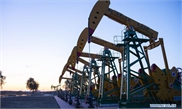SOURCE / INDUSTRIES
China cuts oil retail price to buffer global fluctuations

A staff works at a petrol station in Southwest China's Chongqing on Tuesday. Photo: cnsphoto
China is scheduled to cut the retail prices of gasoline and diesel starting Wednesday, a move to buffer the negative effects of violent fluctuations in global oil prices.
Based on recent changes in international oil prices, the domestic retail price of gasoline will be reduced by 1,015 yuan ($145) per ton and that of diesel will be cut by 975 yuan per ton, according to the National Development and Reform Commission (NDRC), the country's top economic planner.
Industry analysts said it is the largest prices drop since a new pricing mechanism for fuel was implemented in 2013.
The price cut will help lower the cost of consumers significantly. For example, consumers will save about 40 yuan to fill a car's fuel tank with a capacity of 50 liters, Shandong Province-based commodities consultancy SCI99 Inc told the Global Times on Tuesday.
The retail price for 92-octane gasoline is now about 6.32 yuan per liter and for 95-octane gasoline it is 6.73 yuan. After the price reduction, the price will drop to more than 5 yuan, which was similar to the level in 2016, said a report by cctv.com, citing a person in charge of a filling station in Beijing.
The fall in international oil prices was the main reason for China's refined oil prices drop, Qu Xinrong, senior research fellow of the Shanghai Petroleum and Natural Gas Exchange, said.
"The price of refined oil in China fluctuates according to a composite index of a blanket of international indices, which declined significantly, pressured by a supply glut and fears over even weaker demand, resulting from the coronavirus pandemic," said Qu.
After the world economy stabilizes and oil demand picks up when the COVID-19 epidemic comes under control, the turning point for the oil price to pick up will come, according to Qu.
China is a major crude producer, importer and consumer, and an oil price that's either too low or too high will lead to a negative impact on the country, analysts said.
The price reduction aims to hedge the negative impacts of violent fluctuations in the global oil markets because excessively high prices will increase consumers' burden, Peng Shaozong, an official with the NDRC, said at a press conference.
Also low prices could hurt domestic oil production, leading to higher dependency on imports, said Peng.
"The price declines of crude oil range from 50 percent to 67 percent based on past experience in times of weak oil demand and price wars among countries. With China's oil price down nearly 50 percent from February 10, there is little room for further declines," Qu said.
Zhou Xuezhi, a research fellow at the Chinese Academy of Social Sciences, noted that the future price will depend on global supply and demand, and whether there will be an agreement between Russia and Saudi Arabia.
As of 6:20 pm Beijing time, Brent crude oil was down 11.37 percent at $31.41 a barrel while US West Texas Intermediate was down 9.05 percent at $28.86 a barrel.
As of Wednesday, there have been five times that China adjusted the retail prices of oil products this year, including three price cuts, media reports said.
China adjusts the prices of oil products every 10 working days to better reflect changes in the global oil market, according to the NDRC.

